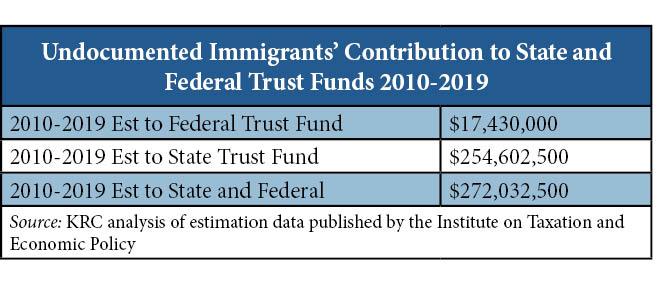The COVID-19 pandemic has revealed numerous ways in which our political community is unfair to many people—and especially those with low incomes and people of color. But perhaps the most disturbing inequity is that immigrants, both documented and undocumented, have been left out of much of the relief efforts so far.
Both documented and undocumented immigrants play a critical role in the economy of our state and nation. Immigrants to America are our neighbors, our friends, our employees, and, in some cases, our employers.
There are 28.3 million foreign-born residents in the labor force, of which 7.5 million are undocumented immigrants. More than 866,000 immigrants aged 16 or older live in Pennsylvania, of which over 582,000—including 91,000 undocumented immigrants—are part of our workforce. Almost 9% of Pennsylvania’s workforce was born abroad, and 1.4% of the workforce is here without documentation.
Immigrants in America—including undocumented immigrants—pay taxes. Annually, they paid a total of $11.6 billion in state, local, and school taxes nationwide, including $139 million in Pennsylvania. They all pay sales taxes and property taxes—directly or indirectly. And many not only pay state and federal income taxes but have Social Security and Medicare taxes deducted from their wages, even though they are not eligible to receive either of those benefits.
Undocumented immigrants also contribute significantly to unemployment insurance funds despite being ineligible to receive any unemployment benefits in times like these. According to data published by the Institute on Taxation and Economic Policy, undocumented immigrants in Pennsylvania have contributed over $272 million to the State and Federal Trust Funds from 2010 to 2019.
Despite their important contribution to our economic life, immigrants have been excluded from receiving many kinds of relief benefits offered by our federal and state governments. And undocumented immigrants are not eligible for any benefits. Yet they, too, are suffering from lost jobs and wages and, as a result, are struggling to feed their families and pay their rent and mortgages.
Moreover, mixed-status families may also be excluded from initial stimulus checks. According to data published by the Migration Policy Institute, Pennsylvania has an estimated 128,000 undocumented immigrants who are ineligible for stimuli, many of which have spouses or children who are either U.S. citizens or green card holders. The result is that an additional 55,000 citizens and green card holders will not receive any aid because of the mixed status of their family. A total of 183,000 people (undocumented immigrants and their spouses or children who are either documented or citizens) are ineligible for any assistance giving Pennsylvania the 17th largest ineligible population in the country as shown below.
Documented immigrants are also finding it difficult to secure help from the government during this emergency. U.S. citizens who have a spouse or a dependent with no social security number have been denied emergency help. International college students listed as a dependent on another immigrant’s visa are also not getting any stimulus. And a spouse listed as a legal dependent on a documented immigrant’s work visa does not qualify for the additional $500 payment for dependents.
We live at a time when anti-immigrant sentiment is embraced by many political leaders and at a time of crisis when many of us are struggling. But that is why more of us need to speak up on behalf of our friends and neighbors who have come to the U.S. from other countries, no matter how they arrived. The truth is that no matter how they come to this country, people do so because someone is willing to hire them to do a necessary job. Once here, they make a contribution to our economy. And immigrants only come to America if they are willing to take the risk of uprooting themselves from their homeland and starting all over in a new country with a new language. The history of our country shows that those willing to make such a journey—and their children who are among the proudest of our citizens—have contributed enormously to our country.
So it is simply a matter of justice that we not exclude immigrants from the emergency benefits that citizens are receiving in this time of crisis. And it is also a matter of good economic policy. Restarting the economy will happen faster if we ensure that everyone, including immigrants, can support their families now and can more easily dig out of the economic hole created by the measures we have taken to protect us from COVID-19.


